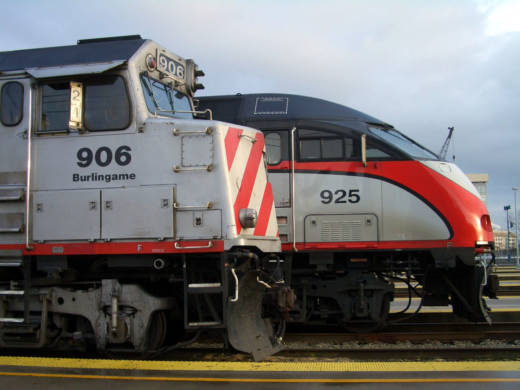"This is like moving from a Model T to a Tesla," Rep. Jackie Speier, D-San Mateo, said in a statement. "Each is beloved on its own terms, but only one can do the modern job of moving America forward."
The federal approval of the project's full-funding grant agreement was put on hold in February after all 14 Republican members of California's House delegation urged Transportation Secretary Elaine Chao to reject it. Their objection: The Caltrain project will tie into the state's planned high-speed rail network and will use some of the state's voter-approved bullet-train bonds. They oppose further funding for the high-speed rail project, arguing it's financially infeasible.
Chao then delayed action on the funding agreement, which was on the verge of approval when the Obama administration left office. The delay led to calls from Gov. Jerry Brown, California congressional Democrats, Bay Area elected officials, and business leaders in Silicon Valley and across the region to approve the project.
Brown called the GOP attempt to stop funding for Caltrain electrification "a real test for Donald Trump. Does he believe in a shovel-ready construction project that will create American jobs, buy American products and is ready to go in a couple of months or not? Because the Republicans are only against it for purely crass political reasons."
One sign that the electrification project might get the money came earlier this month, when Congress approved a federal appropriations bill including $100 million for Caltrain electrification in the current fiscal year. Another $74 million had already been appropriated pending approval of the funding agreement.
Brown issued a brief statement greeting the news the administration had agreed to fund the Caltrain project.
"Secretary Chao did the right thing," the governor said. "This is not only good for California, it’s good for America.”
Although the battle over funding for Caltrain's electrification appears to be over, more battles over federal financing of Bay Area transit projects are likely.
In a preliminary budget released in March, the Trump administration said it wants to eliminate the Federal Transit Administration's Capital Investment Grant program. Those grants have helped pay for a long list of big-ticket transit projects in the region, including San Francisco's Central Subway and BART's extension to San Francisco International Airport.
The Santa Clara Valley Transportation Authority, which got one of the grants to help build the first phase of BART's extension to San Jose's Berryessa District, plans to apply for a $1.5 billion grant to extend BART to the city's downtown transit center.
BART itself has been planning on applying for a Capital Investment Grant of up to $1 billion to modernize its train control system, upgrade its electrical equipment, finish work on a new maintenance center in Hayward and supplement its Fleet of the Future with 306 new train cars.
The Silicon Valley Leadership Group's Guardino, for one, expressed optimism that Congress and federal transportation officials will continue to support important Bay Area transit improvements.
"When we are basing it on good projects and good policy and we can keep raw politics out of the equation, we're gonna win those efforts," Guardino said.
